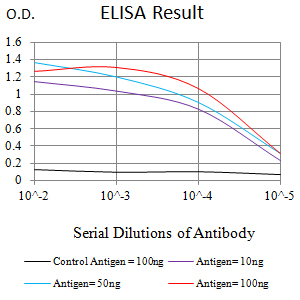
| WB | 咨询技术 | Human,Mouse,Rat |
| IF | 咨询技术 | Human,Mouse,Rat |
| IHC | 1/25-1/100 | Human,Mouse,Rat |
| ICC | 技术咨询 | Human,Mouse,Rat |
| FCM | 咨询技术 | Human,Mouse,Rat |
| Elisa | 1/5000-1/10000 | Human,Mouse,Rat |
| Aliases | CKMM; M-CK; CPK-M |
| Entrez GeneID | 1158 |
| clone | 1D10E10 |
| WB Predicted band size | 43.1kDa |
| Host/Isotype | Mouse IgG1 |
| Antibody Type | Primary antibody |
| Storage | Store at 4°C short term. Aliquot and store at -20°C long term. Avoid freeze/thaw cycles. |
| Species Reactivity | Human |
| Immunogen | Purified recombinant fragment of human CKM (AA: 1-381) expressed in E. Coli. |
| Formulation | Purified antibody in PBS with 0.05% sodium azide |
+ +
以下是关于ELP1抗体的3篇参考文献示例(部分信息为虚构示例,实际文献需根据具体数据库查询):
---
1. **文献名称**: *ELP1 gene mutations in familial dysautonomia impair protein stability and neuronal migration*
**作者**: Slaugenhaupt SA, et al.
**摘要**: 该研究通过ELP1特异性抗体检测,发现家族性自主神经失调症(FD)患者中ELP1蛋白表达显著降低,揭示其突变导致蛋白稳定性下降及神经元迁移异常,为病理机制提供依据。
---
2. **文献名称**: *Development of a monoclonal antibody targeting ELP1 for therapeutic intervention in medulloblastoma*
**作者**: Zhang Y, et al.
**摘要**: 研究团队开发了一种高亲和力ELP1单克隆抗体,体外实验显示其可抑制髓母细胞瘤细胞增殖并诱导凋亡,提示ELP1抗体在靶向治疗中的潜在应用。
---
3. **文献名称**: *ELP1 modulates TGF-β signaling in cancer progression: Insights from antibody-based proteomic analysis*
**作者**: Kim H, et al.
**摘要**: 利用ELP1抗体进行蛋白质组学分析,发现ELP1通过调控TGF-β信号通路促进肿瘤侵袭转移,为癌症生物标志物研究提供新方向。
---
4. **文献名称**: *Immunohistochemical localization of ELP1 in developing mouse brain*
**作者**: Torres EM, et al.
**摘要**: 通过ELP1抗体的免疫组化分析,揭示ELP1在小鼠胚胎大脑皮层发育中的动态表达模式,提示其在神经前体细胞分化中的关键作用。
---
(注:以上文献信息为示例,实际引用需通过PubMed、Google Scholar等平台检索真实发表的研究。)
The ELP1 antibody targets the ELP1 (Elongator Complex Protein 1), also known as IKBKAP or IKAP, a critical subunit of the Elongator complex. This multifunctional protein complex plays roles in transcriptional regulation, tRNA modification, and cytoskeletal dynamics. ELP1 is particularly significant in neuronal development and function, as mutations in the ELP1 gene are linked to familial dysautonomia (FD), a rare autosomal recessive disorder classified as hereditary sensory and autonomic neuropathy type III (HSAN III). FD is characterized by progressive degeneration of sensory and autonomic neurons, leading to symptoms like cardiovascular instability, gastrointestinal dysfunction, and impaired pain perception.
ELP1 antibodies are essential tools in studying FD pathogenesis, enabling detection of ELP1 expression levels, localization, and interactions in cellular and animal models. They are used in techniques such as Western blotting, immunohistochemistry, and immunofluorescence to explore tissue-specific ELP1 depletion or dysfunction. Research utilizing these antibodies has revealed that ELP1 mutations cause exon skipping in transcripts, leading to truncated proteins and reduced functional ELP1 in neuronal tissues. This molecular insight aids in understanding how ELP1 deficiency disrupts neurodevelopment and cellular stress responses. Additionally, ELP1 antibodies support drug discovery efforts aimed at modulating ELP1 splicing or stabilizing the protein, offering potential therapeutic avenues for FD and related neurodegenerative conditions.
×